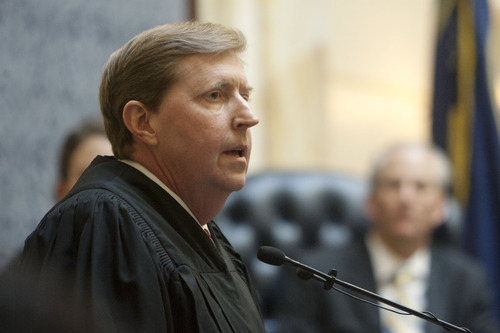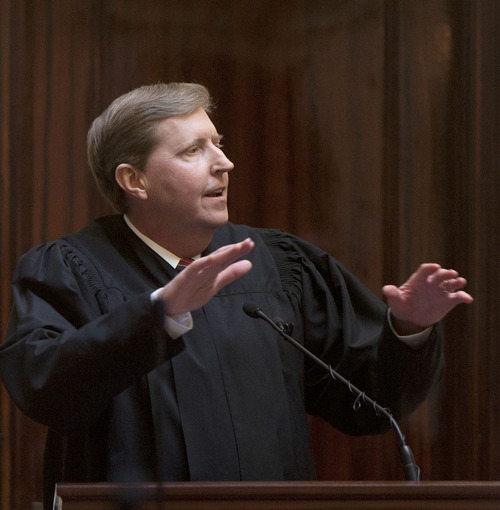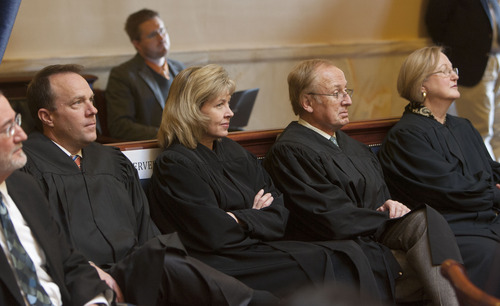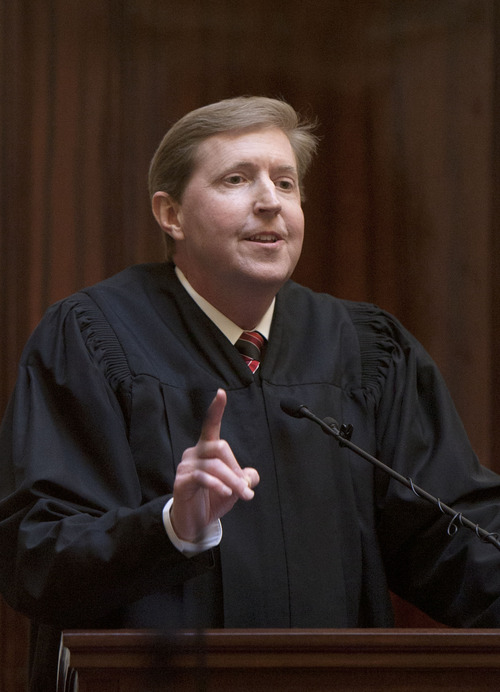This is an archived article that was published on sltrib.com in 2013, and information in the article may be outdated. It is provided only for personal research purposes and may not be reprinted.
Utah courts managed to serve more people more efficiently in recent years despite budget cuts forced by the recession — but courts finally need some extra judges now, Utah Supreme Court Chief Justice Matthew B. Durrant said Monday in his State of the Judiciary address to the Legislature.
He said adding two new judges to help in the 8th District serving the Uinta Basin has "become a critical issue." He said more judges have been needed for four years, but courts delayed seeking them because of tight budgets forced by tough economic times.
"We have used judges from neighboring judicial districts, as well as retired senior judges to fill in," Durrant said. "But the citizens of the 8th Judicial District are entitled to more than a fill-in patchwork of judges."
He endorsed SB125 and SB127 by Sen. Kevin Van Tassell, R-Vernal, to add one regular judge and one juvenile court judge to that district. Estimated combined costs would be $706,600 a year.
Other than the need for those extra judges, Durrant said, "We not only weathered the recession, but came out better for it. Though we faced a 10 percent staff reduction at the same time we were experiencing record high case filings, we were able to improve our efficiency, reducing the age of our pending cases by 34 percent. In other words, cases moved along faster."
He said courts managed in large part by switching to filing cases electronically so that "we move data, instead of pieces of paper, so everything can be seen and worked on by everyone at once."
That also makes court records more transparent and accessible. "A visit to the courthouse is replaced by a visit to our website," he said.
As the economy has improved, Durrant said record high civil filing are returning to more normal levels of growth. "We've made the business adjustments necessary to continue to serve the public with fewer dollars and a downsized workforce and, importantly, we are not asking that any of the staff reductions taken over the past three years be restored."
Durrant added that courts are also doing more to help the poor and middle class who increasingly cannot afford lawyers. He noted that in 56 percent of domestic cases last year, neither party had a lawyer. "This should be troubling to all of us," he said.
Durrant said courts are helping by creating a statewide Self-Help Center, which will assist an estimated 16,000 people this year, and an online court assistance program that helps people prepare court documents "the way a Turbo Tax program might help prepare taxes."
For example, he said when a single-mother was killed and the grandparents needed help applying for guardianship of her child, "They found and called a Self-Help Center staffer, who then walked them, step by step, through the process of finding the correct online tool to help them.... Within weeks, the grandparents became the court-appointed guardians."
Durrant said, "Our courts need to be welcoming to all. Legal problems are not limited to the wealthy, yet too often the services of lawyers are. The high cost of legal services has become a barrier not just to the poor, but the middle class as well."









